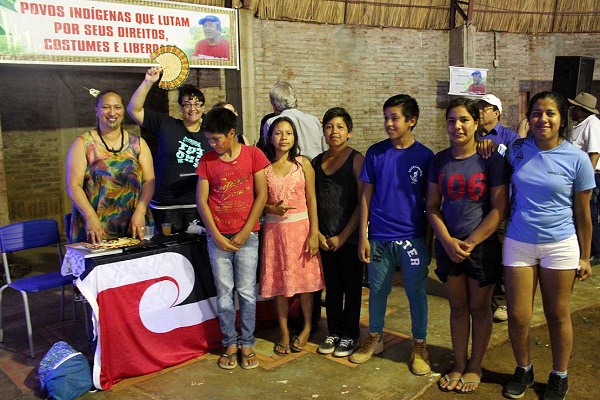
A group of children from the small, remote village of Nonoai, a municipality in the Rio Grande do Sul state and home to the Kaingang people, learned poi dances and other aspects of Māori culture as part of a collaborative project between Brazilian and Massey academics to support language revitalisation in Brazil.
Dr Arianna Berardi-Wiltshire and her colleagues Te Rina Warren and Mari Ropata-Te Hei recently travelled to Brazil to give lectures to university students in at the Federal University of Rio de Janeiro (UFFRJ) and visit village schools working on language revitalisation.
The team is now exploring further ways to adapt Māori language learning immersion methods to help preserve the language of the Kaingang people of Brazil, where Portuguese is the lingua franca and the official national language. Kaingang is one of more than 200 endangered indigenous languages in the vast country, and the academics hope their connections will contribute to the wider issue of indigenous language revitalisation across other parts of Brazil in the future.
“We visited the village schools and shared talks with the community leaders, indigenous education and government representatives in support of the establishment of a full-immersion indigenous language preschool and school inspired by the principles of Māori Kohanga Reo and Kura Kaupapa centres in New Zealand,” says Dr Berardi-Wiltshire.
The women teamed up with Brazilian academic Professor Marcus Maia, of the Federal University of Rio de Janeiro. He visited New Zealand last year to give lectures at Massey University’s Auckland and Manawatū campuses on indigenous language revitalisation efforts in Brazil.
While here, he took an interest in Māori successes in language revival, and saw an opportunity for knowledge collaboration and exchange.
“The Māori case is quite famous around the world because it’s one of few success stories,” Dr Berardi-Wiltshire says.
“We started thinking about the ways the Māori experience in New Zealand might be used to inspire or inform or in some way support the language revitalisation on the other side of the ocean.”
Ms Warren says she was “humbled by the opportunity to share the history of te reo Māori, and the subsequent journey of revitalisation with other indigenous peoples.”
“Learning about the unique position of the Kaingang people was enlightening – it’s heartening that there are a huge number of committed Kaingang people who are willing to re-educate their youth in their native language and in accordance to their customary practises,” she says.
She noted that Brazil’s tertiary system of education provides excellent support to indigenous students, and shows “a real commitment to developing indigenous studies within the universities. I think we could learn a lot from their approach to indigenous education for the Māori context in Aotearoa.”
Over 500 jobs will be cut at the Ministry of Education, and PLD priority changes…
Claire Amos unpacks Prime Minister Christopher Luxon's claim that we should "steal" models of education…
ERO’s new report on the progress of the Aotearoa New Zealand Histories curriculum finds certain…
In a press release, NZPF President Leanne Otene interrogates the coalition government's proposed attendance action…
What happens when the evidence isn't borne by reality? Sally Riordan, from University College London,…
Strategies for raising attendance have been announced by Associate Education Minister David Seymour and Prime…
This website uses cookies.